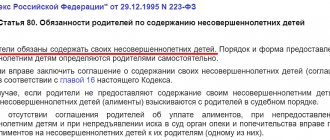Filing a claim in court is almost always accompanied by the payment of a state fee. The amount of this payment depends on several circumstances. In particular, the collection procedure and rules for determining the amount of such payments are stipulated in the Tax Code.
According to the norms of Russian legislation, payment of state duty must be made when government bodies perform certain types of procedural actions, which, among other things, include the consideration of claims for the collection of alimony.
The amount of the fee may vary significantly as a percentage of the amount of the claim or as a strictly defined amount. This requirement is established in Article 83 of the Family Code. The peculiarity of such a state fee is that the amount of deductions does not depend on the region where the claim was filed, and the final amount of the fee often depends on the value of the claim.
The amount of state duty in court for alimony in 2019
The amount of state duty for alimony depends on several factors.
| Amount of state duty (RUB) | Content | Regulatory framework |
| Statement of claim for alimony by the plaintiff. The obligation to pay the fee is assigned to the defendant in the amount determined by court decision. | Art. 333.36 Tax Code of the Russian Federation | |
| 150 | Collection of alimony by opening a claim proceeding | Article 333.19 of the Tax Code of the Russian Federation |
| 300 | Collection of alimony for children and ex-spouse | |
| 600 | Divorce and alimony obligations | |
| 300 | Establishing paternity | |
| Determining the order of communication with children | ||
| Depends on the cost of the claim | Property division | |
| 300 | Additional requirements | |
| 0.5-4% of the difference (not less than 400) or 300 | Changing the amount of alimony support | Part 6 Article 91 Code of Civil Procedure of the Russian Federation Art. 333.19 Tax Code of the Russian Federation |
| from 250 for notary services | Certification of the agreement on the procedure for financial support of minors | Art. 99-100 RF IC Article 333.24 of the Tax Code of the Russian Federation |
Also, the plaintiff will not have to pay a state fee for filing a claim related to alimony for:
- increasing the amount of alimony;
- collection of financial assistance to cover expenses associated with a child’s illness or expensive operation;
- collection of arrears of alimony.
Who is exempt from paying state duty?
Provisions of Art. 333.36 of the Tax Code establishes a list of persons who are bearers of benefits applied when paying duties.
This is important to know: Statement of claim to cancel a disciplinary sanction: sample
Among these categories of citizens are:
- heroes of the USSR;
- heroes of the Russian Federation;
- Knights of the Order of Glory;
- participants and disabled people of the Second World War;
- disabled people of the 1st and 2nd groups, upon presentation of claim documents to the courts of general jurisdiction, the magistrates' court and the district court;
- veterans of military service and combat who apply to the court of general jurisdiction and the magistrate's court.
Benefits cannot be provided to this category of persons only in cases where the amount of claims set forth in the claim exceeds 1 million rubles. The specified excess is the basis for calculating and paying state duty in the general manner.
The application of the benefit is possible only when a copy of the document confirming the right to be exempt from the obligation to pay is attached to the case materials presented by the applicant.
How to pay the state fee to court for alimony?
It happens that plaintiffs attach the amount of money to pay the state fee to other documents when filing with the court. But, of course, the state fee is not paid to the court clerk or assistant judge. The payment procedure is different.
First of all, you need to obtain payment details to pay the fee. As a rule, they are available at the information stand in the court premises or on the official website of the court. As a last resort, you can ask the court staff for them.
Details include the following data:
- Obtaining payment details on the official website of the judicial system, information stand in court:
- name of the addressee – state budget;
- TIN;
- checkpoint;
- OKTMO;
- name of the banking institution;
- recipient's current account.
- Filling out a payment order:
- Full name of the addressee;
- registration data;
- purpose of payment;
- amount in monetary terms;
- calendar date.
- Payment by one of the following methods:
- bank cash desk;
- online banking (non-cash);
- self-service technical means – ATM (cash/plastic card).
Important! A receipt for payment of the state fee with visible details of the recipient and payer data must be attached to the statement of claim.
Alimony cases are heard by magistrates' courts. You can contact the tribunal in the order of writ proceedings (with an application for the issuance of a court order) or in the order of claim proceedings (with a statement of claim).
Almost always, disputes arise between parents regarding the maintenance of the child (for example, the father refuses to pay child support, does not work, hides the actual amount of income, goes into hiding). In such cases, alimony can only be recovered through a lawsuit. To do this, you need to correctly draw up and submit a statement of claim to the tribunal.
Exemption from state duty
According to the norms of Russian legislation, financial obligations to pay the state fee when filing a claim in court directly depend on the category of citizens who apply to the judicial authority. If the applicant falls into one of the categories defined by law, no interest is paid.
The Tax Code defines the following categories of citizens:
- Heroes of the USSR and Heroes of Russia.
- Knights of the Order of Glory.
- Disabled people of the Great Patriotic War.
- Participants of the Great Patriotic War.
In addition to the above categories of citizens, the following persons are exempt from paying state fees when filing a claim:
- Persons recognized as disabled people of the first or second group.
- Persons who took part in hostilities.
Does the alimony plaintiff pay fees?
Article 333.36 of the Tax Code of the Russian Federation, paragraphs. Part 2, Part 1 directly establishes that plaintiffs in cases of alimony collection are subject to unconditional exemption from paying taxes.
Thus, when you go to court with a request to collect child support, either through a claim or an order, you will not have to pay any state duty.
- In the future, the state fee will be collected from the defendant if the plaintiff’s demand is satisfied by the court.
- If the claim is rejected, the plaintiff will be required to pay the necessary funds for the consideration of the case.
A review of the judicial practice of the Supreme Court of the Russian Federation dated May 4, 2005 (question 8, procedural issues section) also established that plaintiffs in cases of alimony collection are a special procedural category for which there are benefits for paying fees.
Fee for an order to collect alimony
The state fee when filing a claim or application for alimony with the issuance of an order depends on the final decision of the executive body.
When can I receive an order?
The Family Code and Resolution of the Plenum of the Supreme Court No. 9 establish that a court order for the collection of alimony is issued when:
- it is required to pay funds for the maintenance of children under 18 years of age;
- there is no need to establish or challenge paternity;
- there is no need to involve other persons;
- the amount of payment depends on the defendant’s earnings (according to Article 81 of the Criminal Code).
Read also: Procedure for divorce
The order is not issued if it is necessary to support children of adult age, spouse, other family members, or receive funds in a fixed amount of money.
Executive authorities can assign alimony in an indisputable manner by issuing a court order. Based on the document, the plaintiff will receive a clearly fixed amount. The debtor has no right of refusal. In this case, the court fee is not paid; the tax fee is set individually.
Who can file a claim for child support?
The right to file a claim for alimony belongs to the ancestors or guardians (trustees) of the baby, as well as officials of child care institutions or municipal bodies acting in the interests of the baby.
If alimony is collected by a parent (father or mother), an indispensable condition is cohabitation with the offspring or daughter - after all, both parents must support the baby equally. It does not matter whether the ancestors are officially married or divorced, live together or separately. Failure of the father or mother to fulfill their own responsibilities for maintaining the baby is the basis for appealing to the tribunal for alimony.
If the child lives with relatives, they have the right to apply for child support to the unlucky parents only after guardianship or guardianship has been established. Only the official trustee or guardian is the legitimate representative of the child and is empowered to represent his interests in the courts.
How to correctly write a statement of claim for alimony?
There are rules for drawing up a statement of claim established by civil procedure legislation (Article 131 of the Code of Civil Procedure of the Russian Federation). Failure to comply with these standards may lead to unpleasant consequences - return or abandonment of the claim.
So, the statement of claim must contain the following information:
- the name of the magistrate court to which the claim is filed;
- information about the plaintiff and defendant - full name, residential address, place of work, contact information;
- information about children - full name, date of birth, residential address;
- title of the document “Statement of Claim for the recovery of alimony for the maintenance of a minor child”;
- description of the circumstances: refusal of the father or mother to fulfill the obligation to support their son or daughter, violation of the rights of the child;
- evidence of the described circumstances;
- reference to the norms of family, civil and civil procedural legislation;
- claims - for the recovery of alimony from the parent (you can specify the desired procedure for calculating alimony - in a flat amount or as a percentage of earnings, the method of transferring funds, the regularity of payments);
- list of applications;
- date and signature of the plaintiff.
How to increase the amount of alimony in pre-trial order?
If there is an agreement on the payment of alimony, it can be changed by agreement with the alimony payer. Such changes must be made in the appropriate form; we must not forget that this agreement is subject to notarization and becomes valid only if this condition is met. Such a solution to the issue of increasing alimony is rare in our time. Most often, ex-spouses who have disputes about children cannot agree on a peaceful resolution of the conflict. Mediation can help in such a matter - participation in negotiations on the issue of pre-trial settlement of the dispute gives a positive result.
In addition, I would like to note that alimony can also be increased by submitting one application to the bailiff for indexation. As a rule, in the decision the court indicates the indexation of alimony taking into account the cost of living for the child. In this case, when fulfilling the requirements of the writ of execution, the bailiff can and is even obliged to constantly index alimony. You just have to remember and remind him.
Increasing child support is a very important aspect of child support. It is important to understand that all this is done only for and in the interests of the child himself. Life is constantly moving. Income and spending are growing. It is necessary to constantly (annually) monitor the expenses for the child and, if possible, the income of the alimony payer. In terms of protecting the rights of the child, there is a wonderful advantage - the state fee is not paid. Thus, the process of protecting the rights of the child and increasing child support is essentially free. You don't lose anything, you only gain.
Documentation
Filing a statement of claim is impossible without attachments - documents confirming the circumstances described in the claim and the legal requirements of the plaintiff.
The main documents attached to the claim will be:
- a copy of the plaintiff's passport;
- marriage or divorce certificate of the plaintiff and defendant (if they were or are married);
- birth certificate of the child for whose maintenance alimony is being sought. The parents must be indicated on the birth certificate - only in this case are they obligated to support the child. If the father is not indicated or is indicated according to the mother, before collecting alimony payments, paternity will need to be confirmed;
- a document establishing guardianship or trusteeship, if the claim is filed by a guardian or trustee;
- a certificate of family composition issued by the housing authority at the child’s place of residence. This document confirms the place of residence of a minor son or daughter with one of the parents;
- certificate of income of the defendant. It is not always possible to obtain a document of this kind, since parents who refuse to support their children often hide their place of work or the amount of their earnings.
All documents are submitted in the form of simple copies - the originals are presented at the court hearing. It is necessary to submit as many copies of the statement of claim and sets of attachments as there are persons participating in the trial (usually in triplicate - for the court, the plaintiff, the defendant).
Advantages and disadvantages of “fixed” alimony
The advantages of collecting a fixed amount of alimony are obvious.
Firstly, alimony payers often hide their real income and pay alimony based on documents on minimum wages or “zero” declarations. A fixed amount of alimony is an opportunity to collect an amount that corresponds to the real financial capabilities of the payer.
Secondly, this is convenient in cases where it is impossible to determine the exact amount of wages, and therefore it is impossible to calculate the share of income.
Of course, there are also disadvantages to this method. Firstly, if the court does not establish indexation percentages for the fixed amount of alimony, in a few years there will simply not be enough money to support the child. Secondly, there is no guarantee that the fixed amount established by the court will be higher than the share of the alimony payer’s earnings or higher than the subsistence level. Disadvantages include the lengthy and complex legal process.
Where to file a claim for child support?
Claims for the recovery of alimony payments are filed in magistrates' courts.
According to Article 29 of the Code of Civil Procedure of the Russian Federation, the plaintiff can choose a court - at the place of residence of the defendant or at his own place of residence. Of course, given the plaintiff’s cohabitation with minor children, it is more convenient to file a claim at your place of residence. However, sometimes it is more profitable to file a claim at the defendant’s place of residence - if the court’s decision is positive, the writ of execution will sooner reach the bailiffs.
How to file a claim for alimony?
You can file a claim in person - come to the Magistrates' Court during office hours and register the claim in the office, receiving back one copy with a mark of acceptance by the court.
In addition to filing a claim in person, it is possible to submit it by mail. It is necessary to issue a registered letter, which, in addition to the statement of claim with documents, will contain a list of attachments. Receipt of delivery is proof that the letter was received by the court.
If the statement of claim is accepted by the court, the plaintiff will receive notice of the appointed date, time and place of the court hearing to consider the statement of claim. As a rule, the claim is considered by the magistrate court no later than 30 days from the date of filing (clause 1 of article 154 of the Code of Civil Procedure of the Russian Federation).
Examples of duty calculation
Example: Plaintiff Ivanova filed a claim against her husband for divorce, collection of alimony for herself and the child, as well as for determining the place of residence of the children.
She needs to pay 600 rubles of a fee for divorce, and double the amount of the fee for collecting alimony (300) rubles and the fee for determining the child’s place of residence (300 rubles) will be collected from the defendant.
Example 2: Plaintiff Petrova went to court with a demand from her ex-husband to collect alimony for her minor son, as well as for herself until the child reaches the age of 3 years. When going to court, I did not pay the fee, as I am subject to an exemption from its payment. The court, having considered the claim, satisfied the demand for alimony for the child, but refused to satisfy the claim for financial support for the child’s mother. A tax fee of 150 rubles for the child support claim was collected from the child’s father, the defendant, but the court had to leave 150 rubles for the rejected claim with the plaintiff, obliging her to pay it.
Also on the topic: How to force your ex-wife to account for alimony
When is the applicant obliged to pay a state fee in alimony disputes?
Plaintiffs, if they are payers of alimony and appear in court on issues of protection of their personal material rights with claims:
- on changing the method of collecting funds;
- reduction of penalties for late obligations;
- exemption from payment of alimony debt, etc., -
are required to pay a state fee when going to court , since their actions in this case are not aimed at the interests of the child, but are aimed at improving their financial situation.
How to calculate the state duty when reducing the amount of alimony?
According to para. 2 clause 5 of the “General Provisions” of the Resolution of the Plenum of the Supreme Court of the Russian Federation No. 56 of December 26, 2017, claims of alimony workers for a reduction or change in the amount of paid funds relate to matters of a property nature subject to assessment. In this case, the duty is calculated in accordance with clause 1, part 1, art. 339.19 Tax Code of the Russian Federation.
The amount to be paid is calculated based on the cost of the claim. This dependence can be traced in the table:
The applicant must determine the price of the claim independently before going to court. This value is equal to the amount by which the amount of payments per child for the year will be reduced - see clause 6, part 1, art. 91 Code of Civil Procedure of the Russian Federation.
This is important to know: Disciplinary action for absenteeism without good reason
Example. Ivan I. is obliged to pay alimony for the child from his first marriage in a fixed sum of money equal to 8,000 rubles per month. A disabled child was born into the man’s new family, and Ivan filed a lawsuit to reduce the amount of alimony to 4,500 rubles. per month. The cost of the claim will be:
Next you need to calculate the amount of duty:
- 22000 × 0.03 = 660 rub.
As a result, the amount of the state duty will be:
800 + 660 = 1460 rub.









